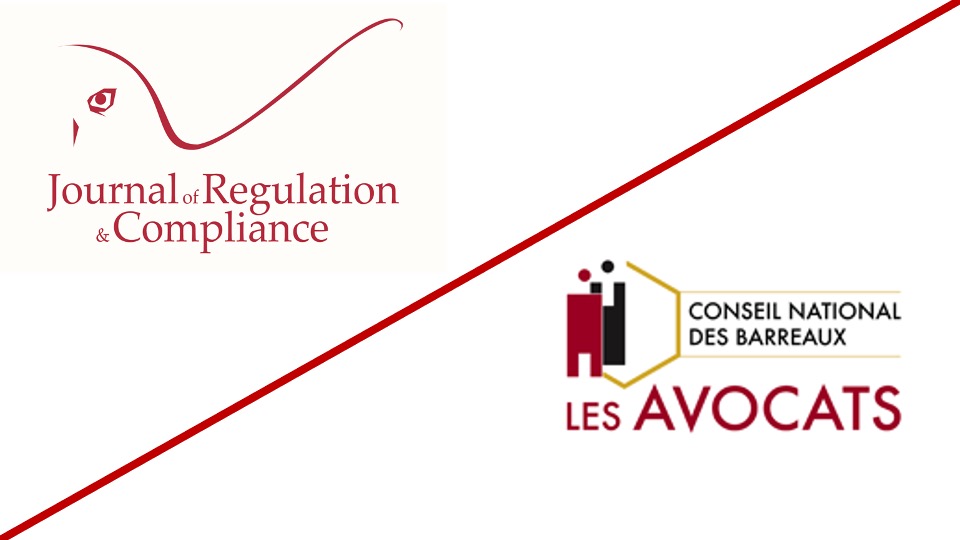🧮Compliance, Vigilance and Mediation
pour lire cette présentation en français ↗️ cliquer sur le drapeau français
► Full Reference: Journal of Regulation & Compliance (JoRC) and Conseil national des Barreaux (CNB), Compliance, vigilance et médiation (Compliance, Vigilance and Mediation), November 30, 2023, Amphithéâtre du Conseil national des barreaux.
____

____
► The symposium is organised by the Journal of Regulation & Compliance (JoRC) and the Conseil national des barreaux (CNB).
This symposium is held in French.
The symposium is placed under the scientific direction of 🕴️Matthieu Boissavy, 🕴️Hirbod Dehghani-Azar and 🕴️Marie-Anne Frison-Roche.
____
► Presentation of the theme: To increase respect for human rights and the environment in the context of corporate social responsibility and compliance, public authorities and companies have for several years been implementing instruments and processes for dialogue between companies on the one hand and stakeholders inside and outside the company on the other. Among these, mediation is regularly highlighted as a necessary and fruitful process for reaching agreements that benefit employees and civil society players, as well as the environment and society as a whole.
John Ruggie, Special Representative of the Secretary-General on human rights and transnational corporations and other business enterprises, in his report of 21 March 2011, Guiding Principles on Business and Human Rights, recommends mediation as an effective and appropriate non-judicial grievance mechanism. The ISO 26000 standard on social responsibility also explicitly refers to the use of mediation in the section Actions and related expectations (6.3.2.6) and say that an organisation should establish or ensure the availability of redress mechanisms for its own use and for that of its stakeholders. For these mechanisms to be effective, they should be [...] based on dialogue and mediation: the process should aim to remedy breaches through mutually agreed solutions reached through dialogue between the parties. Where a judgment is desirable, the parties should retain the right to reach it through separate, independent mechanisms.
Similarly, the French law No. 2017-399 of 21 March 2017 relative au devoir de vigilance des sociétés mères et des entreprises donneuses d’ordre (on the duty of vigilance of parent companies and ordering companies) has given rise to disputes relating to the design and application of vigilance plans by certain companies subject to this law. Mediation has been proposed by the courts, sometimes accepted, and we know that some have been successful.
At the same time, the draft European Directive on Corporate Sustainability Due Diligence (CS3D) is likely to impose or extend obligations relating to the duty of vigilance on a large number of companies in the European Union, for the respect of human rights and the environment by companies in global value chains.
The result of all this is that respect for human rights within organisations and companies depends on recourse to the courts, on cooperation processes such as mediation, both project mediation and mediation specific to the resolution of disputes, while recourse to the courts will not suffice to rapidly make respect for these obligations effective.
The legislator and the parties concerned are aware of this, and they refer to the use of mediation as necessary to help both civil society actors committed to respect for human rights and the environment and companies to reach agreements on compliance with these obligations.
Lawyers, mediators and people assisting stakeholders and companies have an important role to play in the success of these mediations.
In collaboration with the Journal of Regulation and Compliance (JoRC), the Conseil national des barreaux (CNB) is organising a half-day conference on "Compliance, vigilance et médiation" ("Compliance, Vigilance and Mediation") to train lawyers to this activity, which will develop either as an extension of another activity or as its own activity, and which has major implications for individual rights, society and the environment.
____
► Construction of the symposium: After a general introduction to the triptych of Compliance, Vigilance and Mediation and the links that it implies, the first part of the event will focus on the contribution of Mediation to the effectiveness of Compliance and, more particularly, to its most advanced aspect, the duty of vigilance. After a debate on this topic, the second part of the event will focus on the conduct of project mediation or dispute resolution in such a context. A conclusion will enable us to draw immediate lessons from the information and exchanges that have taken place.
____
Speakers:
🎤Matthieu Boissavy, attorney at the Paris Bar, vice-president of the Commission Liberté et droits de l'homme of the CNB
🎤Matthieu Brochier, attorney at the Paris Bar
🎤Stéphanie Brunengo, attorney at the Aix-en-Provence Bat, mediator
🎤Malik Chapuis, judge in the 3rd chamber of the Tribunal judiciaire de Paris (Paris First Instance Civil Court)
🎤Bruno Deffains, professor at Paris Panthéon-Assas University
🎤Hirbod Dehghani-Azar, attorney at the Paris Bar, president of the Commission Modes alternatifs de règlements des Règlements (MARD) of the CNB
🎤Marie-Anne Frison-Roche, professor of Regulatory Law and Compliance Law, director of the Journal of Regulation & Compliance (JoRC)
🎤Jérôme Gavaudan, president of the CNB
🎤Thibault Goujon-Bethan, professor at Jean Moulin Lyon 3 University
🎤Céline Haye Kioussis, legal director if the BPCE Group
🎤Stéphane de Navacelle, attorney at the Paris Bar
🎤Lori Roussey, Data Protection Officer, founder and Director of Data Rights
🎤Stephanie Smatt Pinelli, litigation legal director, Orano Group
____
🔻 Read a detailed presentation of the event below:

comments are disabled for this article